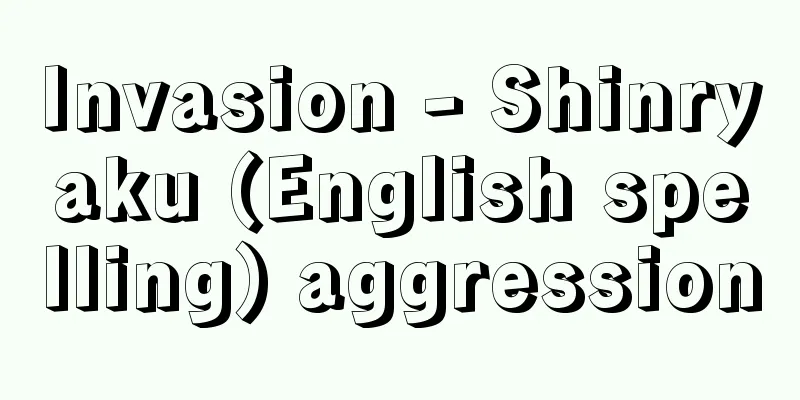Invasion - Shinryaku (English spelling) aggression

|
The concept of aggression only became an important concept in international law in the 20th century, when war came to be deemed illegal. The first example of this was the Treaty of Versailles after World War I, which stipulated that Germany and its allies would be responsible for all damage suffered as a result of a war "caused by aggression" by Germany and its allies (Article 231). The UN Charter provides for the Security Council to determine the existence of an act of aggression and to adopt recommended or mandatory measures to deal with it (Article 39), but does not define aggression itself. Although the Soviet Union concluded a treaty on the definition of aggression with neighboring countries in 1933, no such treaties have been concluded in the international community in general. However, the definition of aggression has been raised as an issue at the United Nations since the Fifth General Assembly in 1950, and a special committee was established for that purpose in 1953, and consideration of the issue has continued. As a result, a resolution entitled "Definition of Aggression" was adopted at the UN General Assembly in 1974. The UN General Assembly resolution states that "aggression, as defined in this definition, means the use of armed force by a State against the sovereignty, territorial integrity or political independence of another State, or the use of armed force in any other manner inconsistent with the Charter of the United Nations" (Article 1), and that "the first use of force in violation of the Charter shall be clear evidence of an act of aggression" (Article 2). The resolution then lists examples of acts of aggression, including the invasion or attack by the armed forces of a State on the territory of another State, military occupation or annexation of territory, bombardment or use of weapons against the territory of another State, blockade by armed forces of another State's ports or coasts, attacks against the land, naval or air forces or merchant fleet or air force of another State, as well as the use of armed forces stationed in another State in violation of prescribed conditions or failure to withdraw them after a prescribed period, and allowing the use by another State of its territory made available to that State for an act of aggression against a third State (Article 3). No political, economic, military or other reasons may justify aggression (Article 5). However, the right of peoples to self-determination, freedom and independence shall not be prejudiced (Article 7). In other words, the liberation struggles of peoples under colonial or racist regimes are not aggression. Thus, the resolution lists in quite detail the acts that constitute aggression, but it is not itself legally binding. The Statute of the International Criminal Court, adopted at the Intergovernmental Diplomatic Conference held in Rome in 1998, nominally lists the "crime of aggression" as a crime that can be punished by the Court (Article 5, paragraph 1), but it states that the Court will not conduct hearings on such crimes until a new definition, etc., is established through an amendment procedure. [Yasuo Ishimoto] "War and Modern International Law" by Yasuo Ishimoto (included in "Modern Law and International Society" edited by Yuichi Takano, 1965, Iwanami Shoten) " "War and Law" by Wakamizu Tsutsui (1976, University of Tokyo Press) [References] | | | |Source: Shogakukan Encyclopedia Nipponica About Encyclopedia Nipponica Information | Legend |
|
侵略が国際法上で重要な概念となったのは、20世紀になって戦争が違法とされるようになってからのことである。第一次世界大戦後のベルサイユ条約で、連合国がドイツおよびその同盟国の「攻撃(aggression)ニ因(よ)リテ強ヒラレタル」戦争の結果、被ったいっさいの損害について責任がドイツおよびその同盟国の側にあると規定された(第231条)のは、その最初の例である。 国連憲章は、安全保障理事会が侵略行為の存在を決定し、それに対処するため勧告または強制措置をとることとしているが(第39条)、侵略そのものについては定義をしていない。1933年にソ連が近隣諸国との間に侵略定義条約を締結したことはあるが、国際社会一般ではこの種の条約は結ばれていない。しかし、国際連合では1950年の第5回総会以来、侵略の定義が問題として提起され、53年にはそのための特別委員会が設置されて、検討が続けられた。その結果、1974年に国連総会で「侵略の定義」と題する決議が採択されている。 この国連総会決議は、「侵略とは、この定義に定められているように、一国が他国の主権、領土保全もしくは政治的独立に対して武力を行使すること、又は国際連合憲章と両立しない他のいずれかの方法により武力を行使することをいう」(第1条)と規定し、「憲章に違反して武力を最初に行使することは侵略行為の明白な証拠となる」(第2条)としている。それに続いて決議は侵略行為を例示し、一国の軍隊による他国領域への侵入もしくは攻撃、軍事占領や領土併合、他国の領域に対する爆撃や武器の使用、軍隊による他国の港もしくは沿岸の封鎖、他国の陸・海・空軍または商船隊・航空隊に対する攻撃のほか、他国に駐留する軍隊を所定の条件に違反して使用することや、所定の期間後も撤収しないこと、他国の使用に供した領域をその国が第三国に対する侵略行為のために使用するのを許す行為などを例示している(第3条)。政治的、経済的、軍事的その他のいかなる理由も侵略を正当化することはできない(第5条)。もっとも、人民の自決、自由および独立に対する権利は害されない(第7条)。いいかえれば、植民地や人種差別体制下の人民の解放闘争は侵略ではない。このように、決議はかなり具体的に侵略を構成する諸行為を列挙しているが、それ自体法的拘束力をもつものではない。1998年にローマで開催された政府間外交会議で採択された国際刑事裁判所規程でも、この裁判所による処罰の対象となる犯罪として、名目的に「侵略の罪」があげられてはいるが(第5条1項)、改正手続によってその定義などが新たに規定されるまで、裁判所の審理はなされないとしている。 [石本泰雄] 『石本泰雄「戦争と現代国際法」(高野雄一編『現代法と国際社会』所収・1965・岩波書店)』▽『筒井若水著『戦争と法』(1976・東京大学出版会)』 [参照項目] | | | |出典 小学館 日本大百科全書(ニッポニカ)日本大百科全書(ニッポニカ)について 情報 | 凡例 |
<<: Qingling (English spelling)
>>: New Code of Law - Shinritsu Koryo
Recommend
molecular genetics
...This field, which seeks to elucidate the genet...
Ibuki Mountains - Ibukisanchi
A mountain range on the border between Shiga and ...
Old World porcupine (English spelling) Old World porcupine
…Body length 30-93 cm, tail length 2.5-45 cm, wei...
Gur
...A branch of the Niger-Kordofan language family...
Ernst Kühnel
1882‐1964 German scholar of Islamic art history. S...
Dress-up doll - Dress-up doll
A type of costume doll. A doll that can be played...
Banquet Excerpts
A collection of medieval folk songs. The second an...
German Mysticism (English spelling) Deutsche Mystik
Mysticism, which seeks the union of the absolute ...
Acrobatics - Zatuki
1. Various arts and crafts performed by the genera...
black contemporary music
...Saxon and others began to incorporate electric...
Ploieşti - Ploieşti (English spelling)
The capital of Prahova County in southeastern Rom...
Imagism - Imagism (English spelling)
A poetry movement that occurred in the United Sta...
Yellow guinea yam
...It has not become as important a crop as water...
Macchiaioli - Macchia is (English spelling) Macchiaioli
A group of 19th-century Italian painters. The name...
Affine plane
...Therefore, in affine geometry, the metric stru...









